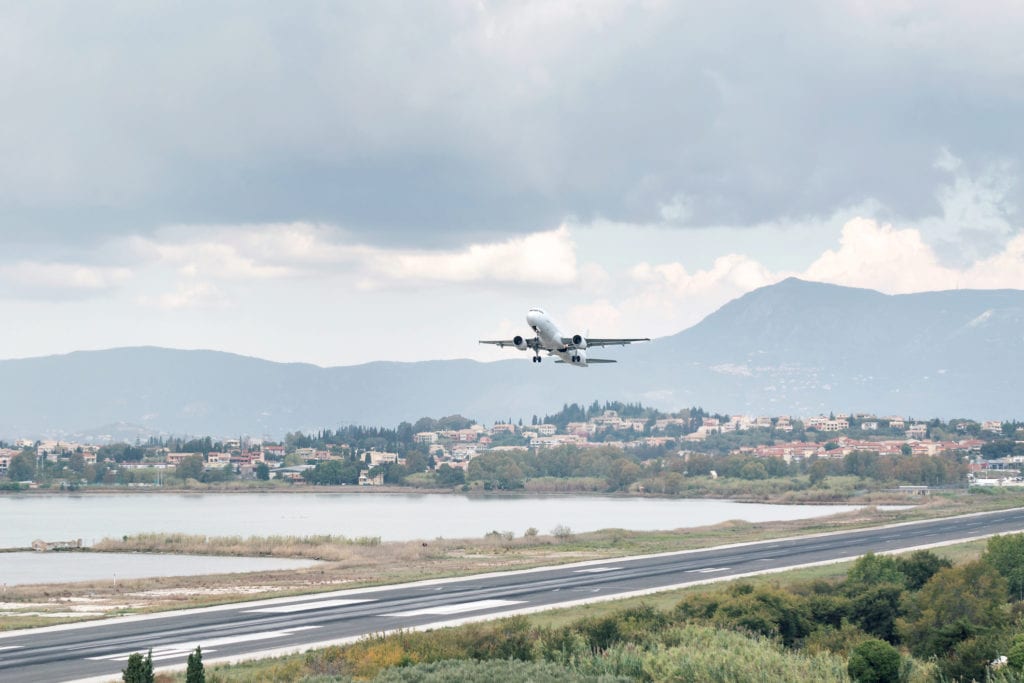Greek Islands: 2025 Business Aviation Destination Guide

For more detailed information on specific destinations and regulations within Greece, please visit our articles on:
June through September is always peak season for Greece creating congestion. Airports throughout the country – both mainland and islands – are inundated with traffic from all over the world. Due to the congestion, authorities are implementing restrictions to accommodate for the influx, which is affecting general aviation (GA).
The following is an overview of what you need to know:
Popular Greek Islands

Popular island and coastal destinations in Greece include Santorini (LGSR), Mykonos (LGMK), Corfu (LGKR), Rhodes (LGRP), Chania (LGSA), Iraklion (LGIR), Kefallinia (LGKF), Preveza (LGPZ) , Thessaloniki (LGTS) and Kalamata(LGKL). Note that LGPZ, LGKL and LGSA are military airports that are accepting also commercial and GA traffic and require, as published in AIP, a lead time of four working days to process the landing permit application, which is required for private a/c and a 48 hours prior notice for PPR – parking – application for all ops including commercial ad hoc flights.
Curfews
While airport overtime had been possible in the past, the Civil Aviation Authority (CAA) has become very strict, rarely approving overtime other than for air ambulance and approved diplomatic flights. Note that your ground handler will always request overtime for your schedule on an as-needed basis. However, authorities are very strict on this regulation and will only approve it for specific cases.
Slots
Many airports in Greece require airport slots during the summer season. As these are high-traffic airports, there is a high demand for services such as slots. Operators need to be flexible based on slot availability and once approved, the slot deviation is +/- 15 minutes. Additionally, if an operator isn’t going to use the slots, they need to be canceled at least 12 hours prior in order to avoid penalties.
Note that airport slots can be requested up to 14 days prior to arrival. In Greece, slots are coordinated by a central slot authority but are also available to book through an online toll, the OCS .
This can be a concern because, even though an airport manager may approve your operation and provide you with a PPR, the flight cannot take place unless the slot coordinator has also approved your slot. Due to high congestion at popular destinations during peak season, you may not be able to secure slot times you request. For example, some airports only provide four slots per hour for both airline and GA traffic, and you may experience significant shortages at your preferred time of operation.
Starting March 2025, Athens LGAV changes to Level 2 – schedule facilitated, and slots will become required. Unlike all other Greek airports, Athens will coordinate both runway and ramp through slot allocation procedure and even though runway slots are not so limited and only short deviations from the requested times are expected, this process will be highly affecting parking availability.
Slot processing and penalties
The national slot coordinator authority is on duty Monday-Friday 0830-1630 local. During the peak of the season and due to the Flight Suspension Procedure, ops hours are extended from early morning to late night and weekend. Slots may be requested up to 14 days in advance, and requests are submitted in general aviation clearance request (GCR) format. Once approved, slots are valid for +/- 15 minutes. All slot-coordinated airports will be reflected on the online coordination system (OCS) system for immediate booking. Penalties for operating without a slot or violating the approved slot time, range from 5,000 – 30,000 Euros. In case of violation, a notice will be issued, and you’ll need to respond within five days. Authorities then review your reply and advise if you’ll receive a fine and the amount of the fine. Note that this whole process is through your ground handling partner and the fine determination process can take up to few months to complete.
Last-minute slot requests
For those ground support providers having access to the OCS, when the national slot coordination office is closed over the weekend and outside of regular hours, or any other time for a more immediate response, it is possible to utilize this tool to obtain slots for your ops.
PPRs
PPR is needed for all airports and must be obtained prior to requesting airport slots. Be mindful that LGMK and LGSR are so congested during high season that PPR can be approved for a max stay of 40 minutes. PPR is added in the GCR slot request, and slot ID should be added at item 18 of your flight plan in ASL format
Be mindful that airport slot mandates are in place only during the summer season, and not required off-season. By regulation, the lead time for a PPR request is 48 hours, but many locations will confirm PPRs within a few hours during airport operating hours. However, in the case of LGPZ and some other locations, the full 48 hours notification is always necessary. Once the PPR is approved, you’ll receive a 10-digit confirmation. Note that airport slots may only be requested after your PPR has been confirmed and slot request must match exactly the times approved on the PPR.
Parking

GA aircraft are also competing with commercial airline traffic for limited services and slots during the peak travel season to the Greek Isles.
GA aircraft are also competing with commercial airline traffic for limited services and slots during the peak travel season to the Greek Isles.
Airport parking is always in high demand during the peak summer season. The Greek Islands have limited parking. Other popular airports, like Corfu or Heraklion, even though they do not publish official restrictions, have their own local procedures in place.
Many popular destinations in Greece cannot provide overnight GA parking due to limited parking stands.
While drop and goes are always an option at congested Greek airports, you’ll need to carefully juggle the schedule based on available PPRs and airport slots.
Be mindful that operating flexibility is restricted by night curfews at many airports, while slot availability is very limited at others.
For parking alternates, please contact Universal Aviation Greece to discuss the most suitable alternative amongst several smaller regional airports.
Repositioning aircraft
Airports on the mainland and small, less popular islands have traditionally been used as reposition parking for aircraft that can’t remain on the ground. Many of these airports have received a large uptick in scheduled commercial traffic. This influx has made parking an issue for these airports, especially for GA aircraft.
Many airports are experiencing situations where no parking is available, or they are limiting the permitted time on the ground. The parking situation is always influx, and what is available now may not be an option later the same day due to the number of requests for parking these airport authorities are receiving.
For assistance with parking in Greece, contact Universal Aviation Greece.
Handling
Advance notification is advised when operating to popular smaller airports. Be aware of restricted operating hours at smaller airfields, and confirm if overtime arrangements are possible. If aircraft parking is not available, drop-and-go will be permitted. Due to limited aircraft parking availability at some outlying airports, you may encounter issues with schedule changes.
When requesting ground handling, it’s important to provide a full schedule, operator name, aircraft type and registry, maximum takeoff weight (MTOW), and – if known – passenger and crew names. While smaller airports have certain limitations in terms of GA support services and infrastructure, adequate handling and credit can be set up with sufficient pre-planning. We recommend notifying ground handlers of arrivals at least 48 hours prior to the estimated time of arrival (ETA).
FBOs
Most visitors to the Greek Islands proceed directly from their aircraft to their destination and do not linger at the airport. The crew usually reposition the aircraft to larger airports with available parking on the mainland. Therefore, the islands do not have or need a traditional Western-style FBO.
None of the popular Greek Isle airports have general aviation terminals (GAT), with the exception of Mykonos, Corfu and Kos, which have a small lounge outside of the terminal that is required for all GA users to use. It appears that these new establishments are becoming a trend and we expect more similar facilities to be introduces around Greece in the near future. The cost of the lounge is high. At all other Greek Islands, you’ll clear CIQ in the main passenger terminal.
Your ground handler will submit passenger and crew data in advance and escort passengers and crew with luggage to the terminal for clearance. Ground handlers usually arrange priority passport control and screening for GA operations when allowed by the authorities.
Hotels

Summer in Greece is far busier than winter, and it will not always be possible to book accommodations at specific hotels. If you’re looking for a particular hotel in Greece during high season, it’s best to book at least a couple of weeks in advance; prior to booking, make sure that aircraft parking is approved if the hotel is meant for crew members needing to remain close to their aircraft.
Otherwise, your ground handler will be able to source alternate 4- and 5-star options in most cases. It’s rare for hotel accommodations in any area of Greece to completely sell out. Be aware, however, that room rates are much higher during July and August at popular Greek island locations.
Crew accommodation can be extremely limited and enormously expensive at certain island locations during high season. For example, if you’re able to find crew accommodations at LGKR or LGIR, you may need to split up at different hotels, and room prices could be several hundred Euros/night. The going rate for high season 4-star crew accommodations at most popular island destinations could be about 300 Euros/night or more on last minute bookings.
Ground Transport
In terms of local travel, prepaid transport (car with driver) options are often scarce and may not be available on really short notice. Vehicle selection is limited, and rather than limos or SUVs, you’ll likely end up in minibusses. For those planning to use public taxis, it’s best to arrange this via your ground handler or hotel to ensure prices are fixed and the source is reputable. We do not recommend rental vehicles for crews not familiar with the region, as traffic can be chaotic, road signage is limited, and parking can be difficult.
Fuel
While most airports in Greece have Jet A-1 available and accept all major fuel cards and contacts, there are limited options in terms of on-site fuel providers since fuel consortiums are formed. As peak operating hours vary from airport to airport, it’s best to confirm these periods in advance. Even though fueling the aircraft upon arrival, when overnight parking is granted, is a good practice, you may experience delays in receiving the service as fuel providers serve departing aircraft with priority.
Catering

Only large international airports in Greece have on-site in-flight caterers. At many locations and most of the islands in Greece, your best option will be to obtain catering from local hotel restaurants. Be sure to work with your ground handler to confirm that catering from outsources is allowed onto the ramp.
Security
Security and/or safety concerns for those visiting the Greek Isles are no different from such issues in other European countries. It’s always best to practice basic security awareness.
Customs
Expect to clear CIQ in the main terminal along with scheduled commercial passengers. Priority clearance may be possible to arrange, at CIQ’s discretion, to allow you to clear at a separate counter in the main terminal. If the flight is arriving from or departing to a European Union (EU) location, no passport control or customs are applicable; however, you’ll need to present identification. The clearance process is usually no more than one to two minutes per passenger on arrival, and three to four minutes on departure. For operations to/from non-EU destinations, passport control and customs are applicable, and the standard clearance process typically requires three minutes per passenger.
Peak season/high-traffic events

June through September is always peak season for Greece, creating congestion. Airports throughout the country – both mainland and islands – are inundated with traffic from all over the world. Due to the congestion, authorities have implemented restrictions to accommodate the influx, which is affecting general aviation (GA).
Conclusion
When operating to popular destinations in Greece between April and October, it’s important to consider access and parking limitations along with airport curfews. Short notice requests may be a challenge to operate on your planned schedule and to park overnight at preferred destinations. However, providing advanced notice for operations to these popular destinations will allow your 3rd-party provider and ground handler to provide you with additional options. Hotels can be a concern for certain high-traffic destinations, especially at short notice.
Business aircraft operators need to be diligent on prior permission required (PPR) and airport slot coordination when operating to popular Greek islands during peak season (June– September). Overnight parking at many locations will be almost impossible to obtain. So, be prepared to drop, go, and reposition. Airport slots can be a concern for high traffic destinations, so it’s recommended that advance arrangements are made.
When scheduling flights to popular Greek holiday destinations during peak travel season, it’s important to plan as far in advance as possible. Use all available resources, including your 3rd-party provider and ground handlers, to be aware of all operational considerations, restrictions, and recommended Plan B contingency strategies. Be aware that airport slots may not be available for your requested schedule, and if you operate outside the approval or without one, you will face a fine. Also, it’s important to obtain your PPR in advance, and only after it’s approved can you request airport slots. However, with advanced notice, more slot options are available for your flight, so it’s always recommended to take advantage of this.




